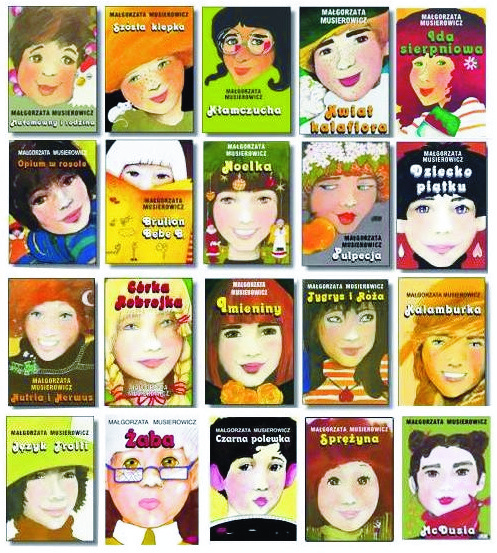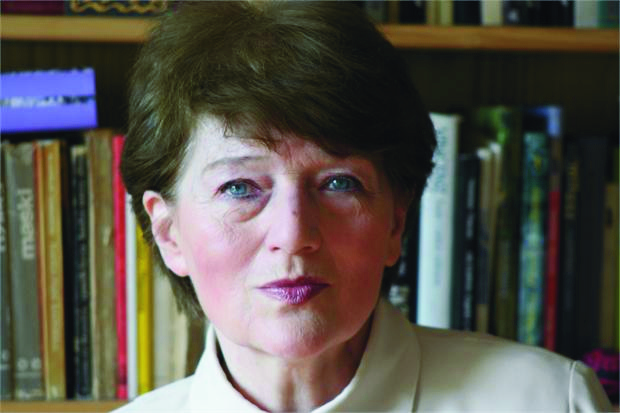Title of the work
Country of the First Edition
Country/countries of popularity
Original Language
First Edition Date
First Edition Details
Ed. pr. of the first volume 1977, ed. pr. of the last volume 2018; Łódź: Akapit Press. Average size of a volume: 200 pp.
Genre
Bildungsromans (Coming-of-age fiction)
Fiction
Illustrated works
Novels
Teen fiction*
Target Audience
Young adults
Cover

The covers of Jeżyciad, courtesy of Akapit Press, publisher.
Author of the Entry:
Summary: Joanna Kozioł, University of Warsaw, joasia7777@interia.pl
Analysis: Karolina Anna Kulpa, University of Warsaw, k.kulpa@al.uw.edu.pl
Peer-reviewer of the Entry:
Katarzyna Marciniak, University of Warsaw, kamar@al.uw.edu.pl
Elżbieta Olechowska, University of Warsaw, elzbieta.olechowska@gmail.com

Photo by Emilia Kiereś.
Małgorzata Musierowicz
, b. 1945
(Author, Illustrator)
A writer and graphic designer. Sister of Stanisław Barańczak (famous Polish poet and translator), wife of Bolesław Musierowicz, a Polish architect with whom she has four children; one of her children, Emilia Kiereś is also a writer, translator and editor.
Born January 9, 1945 in Poznań. Małgorzata Musierowicz attended high school in the same city and later the School of Art, where she obtained a degree in graphic design. In the beginning of her career she published essays in the prestigious Polish weekly Tygodnik Powszechny. Her first book was entitled Małomówny i rodzina [Tight-lipped and the Family], 1975. In 1977 she began to write her hugely popular series entitled Jeżycjada [Jeżyciad]. The title was suggested by prof. Zbigniew Raszewski (1925–1992), a Polish theatre historian, on the pattern of the word Iliad (in Polish Iliada): Jeżycjada is an epic about people living in Jeżyce, a district of Poznań.
She also wrote a series of books for small children Bambolandia [Bamboland], 1978–1989, and texts for a famous series in Polish literature for small children Poczytaj mi mamo [Read to Me Mum], 1980–1987. She wrote cookbooks: Całuski pani Darling [Mrs. Darling’s Kisses], 1995; Łasuch literacki [Literary Glutton], 1995; Na Gwiazdkę [For Christmas], 2007; Musierowicz dla zakochanych [Musierowicz for Lovers], 2008; collection of essays Frywolitki [Tatted Lace], 1997–2004, and an autobiography Tym razem serio. Opowieści prawdziwe [This Time For Real. True Tales], 1994. Some of her books were made into movies. She received many literary awards: Złote Koziołki [Golden Billy Goats] for Szósta klepka [Sixth Sense], 1979; Kwiat Kalafiora [The Cauliflower in Flower], 1981, was selected for the Hans Christian Andersen Honour List in 1982; Noelka [Noëlly], 1992, has been announced a Book of the Year by the Polish section of IBBY. In 1994 she was awarded the Order of the Smile (an international award given by children for pro–children activities) and in 2008 she received a medal from IBBY’s Polish section for lifetime achievement. In 2010 Fundacja ABCXXI – Cała Polska czyta dzieciom [Foundation ABCXXI – All of Poland Reads to Kids] gave her a special award for her lifetime achievement. Until recently, she lived in Poznań, now in the countryside near Poznań.
Sources:
Official website (accessed:January 11, 2018).
"Małgorzata Musierowicz", in Nowa Encyklopedia Powszechna, vol. 4: M–P, Warszawa: Wydawnictwo Naukowe PWN, 1996, 338.
Musierowicz, Małgorzata, Tym razem serio. Opowieści prawdziwe, Łódź: Akapit Press, 1994.
Bio prepared by Joanna Kozioł, University of Warsaw, joasia7777@interia.pl
Translation
Szósta klepka [Sixth Sense], 1977:
- Swedish: Sjätte sinnet, transl. Lennart Ilke, Bromma: Mannerheim och Mannerheim, 1984.
- Chech: O kolečko víc, transl. Helena Stachová, Praha: Lidové nakladatelstvi, 1982.
- Russian: Celestina, ili Šestoe cuvstvo: povest', transl. Ksenia Starosel'skaâ, Moskva: Detskaâ literature, 1982.
- German: Celestyna oder Der sechste Sinn, transl. Roswitha Buschmann, Berlin: Kinderbuchverlag 1983.
Kłamczucha [The Liar Girl], 1979:
- Japanese: Usotsuki musume, transl. Kazuko Tamura, Tōkyō: Michitani, 2008.
- Hungarian: A Hazudozó, transl. Olasz Ferenc, Budapest: Móra Könyvkiadó, 1988.
- Swedish: Ljugisen, transl. Lennart Ilke, Bromma: Mannerheim och Mannerheim, 1984.
- Vietnamese: Tên nói dói, transl. Thi. Thanh Thu, Ho Chi Minh: Nxb. Tre 2008.
Kwiat Kalafiora [The Cauliflower in Flower], 1981:
Hungarian: A karfiol virága: regény, transl. Bába Mihály, Budapest: Móra, 1987.
Opium w rosole [Opium in a Broth], 1986:
Japonese: Kuresuka 15 sai: fuyu-no owari-ni, transl. Kazuko Tamura, Tōkyō: Iwanami Shoten, 1990.
Noelka [Noelly], 1992:
- Japanese: Noeruka, transl. Kazuko Tamura, Tōkyō: Michitani, 2002.
- Lithuanian: Kalėdukė, transl. Lidija Girevičienė, Vilnius: Vaga, 2006.
Dziecko piątku [Friday’s Child], 1993:
Japanese: Kiny ̄obi umare–no ko, transl. Kazuko Tamura, Tokyo: Iwanami Shoten, 1998.
Nutria i Nerwus [Coypu and Jitter], 1995:
Japanese: Natariya–to iraira otoko, transl. Kazuko Tamura, Tokyo: Iwanami Shoten, 1998.
Summary
Based on: Katarzyna Marciniak, Elżbieta Olechowska, Joanna Kłos, Michał Kucharski (eds.), Polish Literature for Children & Young Adults Inspired by Classical Antiquity: A Catalogue, Faculty of “Artes Liberales”, Warsaw: University of Warsaw, 2013, 444 pp.
Jeżycjada is a saga about the life of succeeding generations of families from a district in Poznań, Jeżyce. It began in December 1975. Most of the volumes highlight the problems of adolescence and early adulthood for girls from these families; the few exceptions are Kalamburka [Punnie], 2001, which describes Melania Borejko's whole life; Język Trolli [Trolla's Language], 2004, and Sprężyna [A Coil], 2008, written from the point of view of younger children. The prominent family of Jeżycjada are the Borejkos. Ignacy Borejko, the head of the family, is a classicist and a librarian. His wife, Melania, is an economist but works as an editor. They have four daughters: Gabriela, Ida, Natalia, and Patrycja. As time goes by, the girls grow up and have their own children. Because of the classicist Ignacy Borejko, Jeżycjada is filled with a love for antiquity. He often quotes ancient authors (Horace, Ovid, Virgil, Seneca, etc.) and reads mythology to his daughters. Unfortunately, he only remembers his daughters' colleagues, who have ancient names (Claudius and Lucius, for example). Ignacy transferred this love for antiquity to his family. All his daughters constantly use Latin quotations, one of them, Gabriela, even becomes a classicist. His love for antiquity also inspires Ignacy's grandchildren. Two of them, Róża and Laura, learned Latin as little girls; Ignacy promised to teach them ancient Greek someday too. The other one, Ignacy Grzegorz, also learned Latin in his childhood. He didn't know Greek yet but admired Greek authors: he read a Polish translation of Homer; he was the most accomplished classicist among Ignacy Borejko's grandchildren.
Analysis
The series Jeżycjada, up to early 2018, has released twenty-two volumes, numbered from zero to twenty-one, including the novel Małomówny i rodzina [Tight-lipped and the Family] added later, see below. The series continued with volume number 23, entitled Ciotka Zgryzotka [Aunt Anguish], published in 2018. The novels present life in Poznań at different periods, mainly post WW2. The books contain amusing dialogues and fascinating descriptions of the city, sometimes sarcastically highlighting the shadows of living in a communist country. The eye-catching graphics by Musierowicz, which show the main characters are an important part of the books.
The Borejko's family loves Antiquity and the head of the family, Ignacy Borejko, thinks that classical education is very important for his daughters (Kwiat kalafiora [The Cauliflower in Flower]). He also talks about Hypatia from Alexandria and Aspasia from Miletus as guiding lights for his four daughters. For this reason, his oldest daughter, Gabriela, has loved ancient literature, including Aristotle, since a young age (Kwiat kalafiora [The Cauliflower in Flower]). The Borejko girls have names with ancient etymologies. In Ida sierpniowa the girl in the title explains that she was born on the Ides of March, and that's why she was named Ida. Her older sister was born on Virgil's birthday, and her father wanted to name her Vergilia, but she is Gabriela. The two younger sisters are named Natalia (her father wanted to baptise her Tibulla) and Patrycja Lidia. The author also explains that when Ignacy Borejko was courting his future wife, Mela, she had to remind him that it was time to get married. He responded by explaining to her the Roman wedding rituals (Kwiat kalafiora, Kalamburka [The Cauliflower in Flower; Punnie]). One of the family's favourite expressions is "By Jove! [na Jowisza!]", which even the youngest grandchildren often use. The link to antiquity could also be noticed in dishes prepared by the family. For example, in Dziecko piątku [Friday Child], a fried egg with toast and ketchup is called "Oko Cyklopa" [Eye of the Cyclops] and in Pulpecja, rolled pancakes with white cheese are named "Paluszki Aspazji" [Aspasia's Fingers]. All these recipes Małgorzata Musierowicz included in her cookbook Całuski pani Darling [Mrs. Darling's Kisses].
Other characters also express their love for Antiquity; Tunio recalls the description of Styx by Aristophanes in Tight-lipped and the Family; in Szósta klepka [Sixth Sense], instead of telling him fairytales, the grandfather talks to his six-year-old grandson about Nero the matricide and the Great Fire of Rome; Jerzy Hajduk, Borejko's friend, reads Meditations by Marcus Aurelius and Konrad Bittner, Aurelia's future husband, compares her to Sibyl (Dziecko piątku [Friday Child]). The characters also refer to myths and ancient history in their speeches. Like Professor Dmuchawiec, who mentions Hydra during a lesson (Kwiat Kalafiora [The Cauliflower in Flower]) and Maciej Ogorzałka, Borejko's neighbour, who talks about Socrates with a bored Matylda (Opium w rosole [Opium in a Broth]).
Sometimes the author refers to ancient culture in descriptions of characters, e.g. she mentions that Pawełek in Kłamczucha [The Liar Girl] has a Roman nose, or she compares Ignacy Grzegorz to a Lotus-eater (Język Trolli [Trolls' Language]). Musierowicz also, as the narrator, recalls ancient statues like the Laocoön Group (Feblik) or expressions like Pyrrhic victory in Sprężyna [A Coil]. Mr. Borejko explains to his granddaughter, Łucja (Ida's daughter), the expression "spiritus movens", meaning, "the moving spirit, the driving force, the mainspring of events" (p. 9). The nine-year-old girl is fascinated by her grandfather's words and decides to become the "coil" (Polish "sprężyna") of good events in Borejko's family. Łucja is the main character of the eleventh volume of the series, so the book is titled Sprężyna.
Further Reading
Musierowicz, Małgorzata, Tym razem serio. Opowieści prawdziwe, Łódź: Akapit Press, 1994
Addenda
The action of Małomówny i rodzina [Tight-lipped and the Family], 1975, didn't take place in Jeżyce but in a fictional town of Śmietankowo. This story was not intended to be a part of Jeżycjada, but finally was included in the series at readers' request. It is numbered as volume “0.”
Musierowicz also changed the language of Małomówny i rodzina [Tight-lipped and the Family] in the second edition (1991), because, as she wrote in the Introduction, she "disliked the style of her previous version."
Detailed bibliographical references can be found e. g. in the catalogue of The National Library of Poland.


